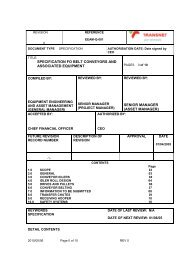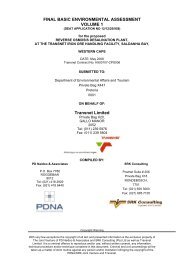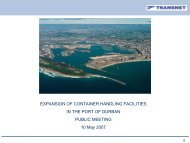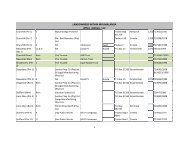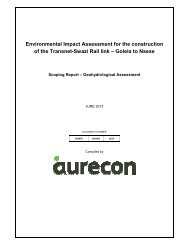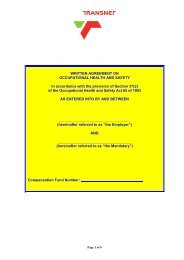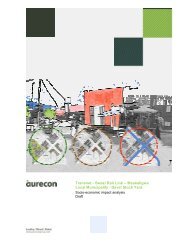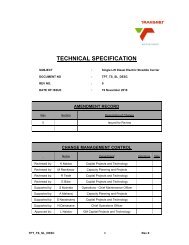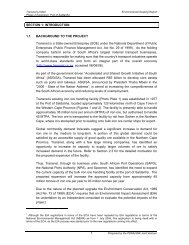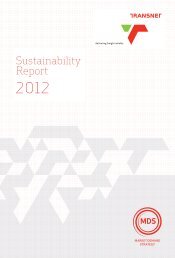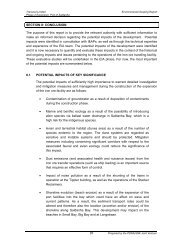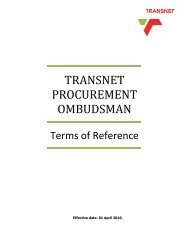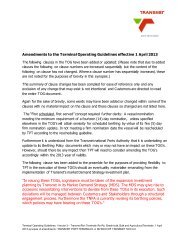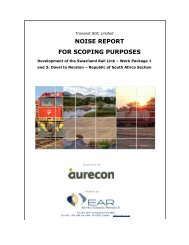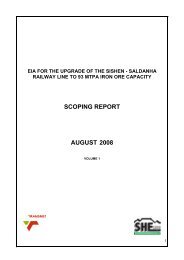Version1: Applicable from 1 April 2011 - Transnet
Version1: Applicable from 1 April 2011 - Transnet
Version1: Applicable from 1 April 2011 - Transnet
You also want an ePaper? Increase the reach of your titles
YUMPU automatically turns print PDFs into web optimized ePapers that Google loves.
6.7. Stacking / Stockpile<br />
6.7.1. Cargo may not be placed or dumped on or near any quayside other than in<br />
accordance with the provisions of the Phase II minute relating to such cargo. If<br />
cargo is placed or dumped at or on any quayside or adjacent areas otherwise than in<br />
accordance with the provisions of the Phase II minute relating to such cargo, all<br />
costs incurred in respect thereof, whether relating to or arising <strong>from</strong> the compliance<br />
with environmental requirements, inconvenience or interruption to the working of<br />
other vessels and/or its storage or removal will be borne by the Cargo<br />
owner/representative or the responsible party as the case may be.<br />
6.7.2. All cargo held in the Terminal must be stacked according to the order of Port of<br />
destination, or the vessel or the contractual agreement. If the Port of destination or<br />
vessel is changed while cargo is already in stack then all costs incurred in sorting<br />
and/or weighing and/or movement and/or re-labelling of such cargo, as a result of<br />
such change, will be for the account of the party which made such request. To the<br />
extent which may be relevant, the provisions of Clause 6.3 above will apply in such<br />
instance.<br />
6.7.3. Excavators and other equipment with steel tracks will not be allowed to be driven<br />
over any quayside or terminal area, unless rubber mats are provided to protect the<br />
terminal road surfaces adequately and any damage which may eventuate <strong>from</strong> such<br />
movement shall be for the account of the Customer.<br />
6.7.4. TPT reserves the right to alter the terms and conditions of stacking space<br />
requirements should the need arise.<br />
6.8. Material Safety Data Sheet/ IMBSC CODE<br />
6.8.1. The Customer must advise TPT of all the characteristics and nature of its cargo, the<br />
method of its handling and all risks associated therewith, by submitting a detailed<br />
Material Safety Data Sheet in advance of the planning and the delivery of cargo to<br />
the CPO. Information pertaining to the IMBSC code requirements must also be<br />
provided.<br />
6.9. Transhipments<br />
6.9.1. Any cargo in respect of which both landing and shipping movements take place<br />
within the same Terminal will be regarded as transhipment cargo.<br />
6.9.2. Direct ship to ship transhipments require the prior approval of TNPA as well as that<br />
of TPT. In such cases a surcharge will be raised by TPT for the occupation by the<br />
transhipment vessel of a berth and for utilizing terminal time.<br />
Terminal Operating Guidelines: Version 3 – <strong>Transnet</strong> Port Terminals Ro-Ro, Break-bulk, Bulk and Agricultural Terminals: 1 <strong>April</strong> 2013<br />
TRANSNET PORT TERMINALS, A DIVISION OF TRANSNET SOC Ltd 32



